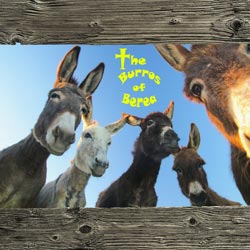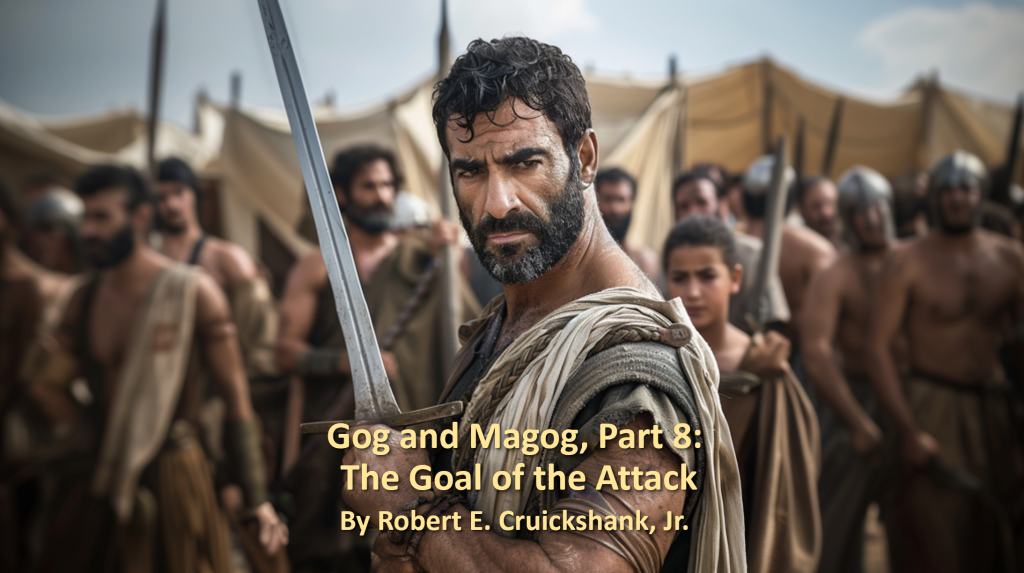Gog and Magog, Part 8: The Goal of the Attack
Copyright © Robert E. Cruickshank, Jr. (March 22, 2024)
All Rights Reserved
“This is what the Lord God says: It will come about on that day, that thoughts will come into your mind and you will devise an evil plan, and you will say, ‘I will go up against the land of unwalled villages. I will go against those who are at rest, who live securely, all of them living without walls and having no bars or gates, to capture spoils and to seize plunder, to turn your hand against the ruins that are now inhabited, and against the people who are gathered from the nations, who have acquired livestock and goods, who live at the center of the world.’ Sheba and Dedan and the merchants of Tarshish with all its villages will say to you, ‘Have you come to capture spoils? Have you assembled your contingent to seize plunder, to carry away silver and gold, to take away livestock and goods, to capture great spoils?’” (Ezekiel 38:12-14).
In a previous installment, it was noted that the Jewish exiles who returned under Cyrus’s decree brought with them an enormous amount of “silver and gold,” along with “goods and cattle” (Ezra 1:5–11; 2:69; 5:14; 6:5; 7:15–16, 18, 22; Neh. 7:71–72).[1] According to Ezekiel, forcibly acquiring these very items from the Jews would be the goal of Gog’s attack. This then places the setting of Ezekiel’s Gog prophecy during the time of Ezra, Nehemiah, and Esther (i.e., the Restoration Period).
Verses 12-14 only serve to reinforce this conclusion. Ezekiel says that Gog will turn his “hand against” the “ruins that are now inhabited (yashav)” and “against the people who are gathered (asaph) from the nations” (Ezek. 38:12). When Nebuchadnezzar was done with Jerusalem, it was in fact left in ruins. And the books of Ezra and Nehemiah, which coincide with Esther’s time, are all about the Jews returning and rebuilding those ruins.
Accordingly, using the same Hebrew words as Ezekiel 38:12, Ezra says:
“Now the priests, the Levites, some of the people, the singers, the gatekeepers, and the temple servants lived (yashav) in their towns, and all the rest of Israel in their towns” (Ezra 2:70).
“When the seventh month came, and the children of Israel were in the towns, the people gathered (asaph) as one man to Jerusalem” (Ezra 3:1).
Scripture interprets Scripture, and Ezra 2:70 and 3:1 are interpretive keys to unlocking Ezekiel 38:12.
Just to reiterate then: Gog’s attack would come at a time when Israel’s people were being regathered, her land was being reinhabited, and her ruins were being rebuilt. Again, this was the time of Ezra, Nehemiah, and Esther. So, the timing and setting of Gog’s attack are fairly simple to pinpoint historically.
But the pop-prophecy pundits of our day don’t see it this way. While it’s a teacher’s job to educate, they prefer to speculate. Plain and simple terms, which were relevant to Ezekiel’s original audience, become code for things relevant to the pundits’ modern audience. As such, a decoder ring is needed to discover the prophecy’s true meaning.
Seeing Things That Aren’t There
And their decoder ring reveals that Ezekiel 38-39 really has nothing to do with the Restoration Period, and that Gog’s attack really has nothing to do with Israel’s livestock after all – even though that’s what the text says.
Case in point: in his book, The Middle East Meltdown, Andy Woods tells the reader that “the Ezekiel 38 and 39 war has to happen sometime between 1948 and Israel’s ultimate restoration during the tribulation period.”[2] He speculates even further, claiming that it will be a time “when the Antichrist comes to power and enters into a peace treaty with national Israel, thereby guaranteeing her protection and survival.”[3]
If we were to list everything mentioned by Woods that is not mentioned by Ezekiel, the list would look like this: 1948, the tribulation period, the Antichrist, and a peace treaty with national Israel. In other words, the list would include everything that Woods mentions – none of which is mentioned by Ezekiel.
Next, the prophecy pundits move from seeing things that aren’t there to changing things that are. It seems that their commitment to a literal interpretation ends when it clashes with their prophetic speculation.
Word Games
Ezekiel says that Gog’s goal was to capture spoil, with a particular eye on Israel’s livestock and cattle. For the prophecy pundits, Ezekiel 38-39 is all about Russia, Russia, Russia. Considering the scenario they propose, we have to ask: does anyone really believe that Russia is going to invade modern-day Israel to take their livestock and steal their cattle?
Well, actually, no they don’t. No one does. Not even the pundits themselves.
Just like “bows and arrows” really means “missiles and rocket launchers,” and “horses and horsemen” really means planes and helicopters, “livestock and cattle” really means “oil and natural gas!”[4] This is the inconsistent approach of so-called consistent literalism.
For example, in a sermon on Ezekiel 38-39, Jerry Falwell got his decoder ring out and let his audience know what this was really all about:
“The purpose of this invasion Ezekiel said, was to take a ‘spoil’— verse 12, chapter 38. If one but removes the first two letters from this word ‘spoil,’ he soon realizes what Russia will really be after—obviously, oil. And that is where we find ourselves today. This, then, is Ezekiel’s prophecy concerning Russia.”[5]
Even if chopping letters off words to make new words were a correct way to do exegesis, however, this still doesn’t help their case. As Golda Meir famously said, “Let me tell you something that we Israelis have against Moses. He took us 40 years through the desert in order to bring us to the one spot in the Middle East that has no oil!”[6] And without that oil, their prophecy plans are foiled.
Not to worry though, their prophetic intuition tells them that the situation in Israel will soon change. Apparently, the fossil fuel they need to run their prophetic train was unearthed by Moses, in the words of an ancient blessing. Andy Woods gets the decoder ring out once again:
“A fascinating verse potentially predicting these very things is found in Deuteronomy 33:24. Here, Moses, while saying goodbye to the tribes just prior to his death on Mount Nebo on the plains of Moab, pronounced blessings upon and made predictions concerning Israel’s tribes. Note Moses’ words to the tribe of Asher: ‘Of Asher he said, More blessed than sons is Asher; May he be favored by his brothers, And may he dip his foot in oil.’ Now this is probably not talking about actual petroleum; or, on the other hand, maybe it is.”[7]
Contra Woods’ imaginative take on the passage, Deuteronomy 33:24 is not code for Asher hitting it big in Big Oil someday. In Biblical times, plant oils were considered precious commodities (Ps. 23:5). Thus, a wise man does not waste oil, but the fool swallows it up (Prov. 21:20). Oil was thought to make the heart glad and was the perfect complement to fine wine (Ps. 45:7; Prov. 27:9; Isa. 61:3; 65:6). As such, a land that was rich in oil was a richly valued land (Deut. 8:8). Consequently, Asher’s blessing isn’t difficult to understand.
As J.R. Porter writes, “the territory of Asher is so fruitful, especially in oil, that he can immerse his feet in oil, instead of merely anointing them with it.”[8] Simply put, this has nothing to do with ExxonMobil.
In this regard, Deuteronomy 33 is no different than Ezekiel 38-39 in that both passages had their own meaning in their own time. As Gordon Fee famously said, “A text cannot mean what it could never have meant for its original readers/hearers.”[9] It would seem that the pundits’ decoder rings are broken. From the Pentateuch to the Prophets, the sellers of sensation turn the world of the Bible inside out and upside down.
Escher’s World vs. Esther’s World
When you really think about it, the approach of Woods and others is a lot like a painting by Maurits Cornelis Escher. Escher was famous for his works that portrayed everything as the opposite of what they’re supposed to be.[10] The Chagall Guevara song, “Escher’s World,”[11] is about his unique artwork.[12] Escher’s World is a world where nothing is what it seems – up is down, down is out, and out is in.
This fits the world of the modern-day, pop-prophecy pundits. A prophecy about events in history’s past is flipped around to events in history’s future. And nothing in the text is what it appears to be. In short, they must reinvent the prophecy to reinterpret the prophecy. Everything really means something else, and nothing really means what it says.
When we allow the text to retain its context, there’s no need to contort Ezekiel’s words or distort Ezekiel’s meaning. The goal and timing of Gog’s attack are as obvious as they are transparent. He comes to seize the Jews’ possessions at a time when their possessions are many and their ruins are rebuilt. He comes at a time when they’re back in their homeland. He comes at the time of Ezra, Nehemiah, and Esther. To understand Ezekiel’s prophecy, we need to exit Escher’s world and enter Esther’s world.
With that said, our next installment will continue to view the prophecy through the windows of that world, as we consider the significance of an attack from the north (Ezek. 38:15), and what that would have meant to a Jew living at the time.
__________________________________________________________
[1] https://burrosofberea.com/gog-and-magog-part-6-mordecais-defiant-stand-and-gogs-evil-plan/
[2] Woods, Andy. The Middle East Meltdown: The Coming Islamic Invasion of Israel (p. 50). Dispensational Publishing House. Kindle Edition.
[3] Ibid.
[4] Woods, Andy. The Middle East Meltdown: The Coming Islamic Invasion of Israel (pp. 63-65). Dispensational Publishing House. Kindle Edition
[5] Q: Dawson, Samuel G. The Resurrection: Israel’s Old Testament Hope in Chronological Order. SGD Press. Kindle Edition.
[6] https://www.brainyquote.com/quotes/golda_meir_115960
[7] Woods, Andy. The Middle East Meltdown: The Coming Islamic Invasion of Israel (p. 65). Dispensational Publishing House. Kindle Edition.
[8] Porter, Joshua R. “The interpretation of Deuteronomy XXXIII 24-5.” Vetus Testamentum 44. Fasc. 2 (1994): 267.
[9] https://www.goodreads.com/author/quotes/13573.Gordon_D_Fee
[10] https://en.wikipedia.org/wiki/M._C._Escher
[11] https://genius.com/Chagall-guevara-eschers-world-lyrics
[12] Q: https://st-ignatius.net/luke-617-26-we-live-in-the-world-of-m-c-escher/


